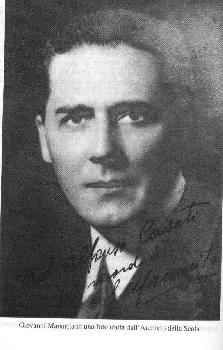Giovanni Manurita
Born Giovanni Manurritta, he was conscripted as a student at the outbreak of World War I, which he had to fight for its entire duration;
in fact, he stayed in the military until 1920. At one point, he was seriously wounded and lost two fingers of his left hand; after that,
he was assigned to the air force, where he served under poet Gabriele D'Annunzio.
After his service, Manurita obtained a law doctorate in Rome, and studied voice there, among others with Emilio Piccoli, the teacher of
Tito Schipa. Manurita made his debut, still in Rome, at the Teatro Quirino as Ernesto, on 27
March 1922. His next two important debuts were in Milano: at the Teatro Carcano in 1923, and at the Dal Verme in 1924. In April 1926, he
was at La Fenice in Venice for the first time, as Almaviva.
From 1927 to 1929, he sang primarily in Denmark, the Netherlands, Belgium, France, Monaco, Spain, Germany and Poland. In January 1930,
he made his US debut in Chicago, as Almaviva, followed by Edgardo. He returned to Germany in 1931, and in 1933 appeared at the
Städtische Oper Berlin.
In 1931, he sang at the Carlo Felice in Genova for the first time, and in February at the Regio in Torino; in April 1932 at the San
Carlo in Naples; and in February 1933 at La Scala in Milano. He toured Finland and Estonia in fall 1935, and sang Duca and Almaviva at
the Opéra-Comique in Paris in December 1936. 1936 was also the year when he shot his first film (two more were to follow in 1938
and 1939, respectively). In opera, the center of his career from 1938 to 1945 was the Teatro dell'Opera in Rome.
During World War II, he participated in a few tours of Germany and German-occupied countries, but that doesn't mean that he was friendly
with the (Italian or German) fascists, on the contrary: he supported the anti-fascist resistance, and was distinguished for it after the
war.
In the last four years of his career, from 1946 to 1950, he ventured into a completely different repertory: Canio, Maurizio, Manrico,
Don José, Loris. In his very last performance, Trovatore in May 1950 in Salerno, he encored "Di quella pira". After
retiring from the stage, he taught voice at the Accademia di Santa Cecilia in Rome.
Reference 1, reference 2: Kutsch & Riemens
Don Pasquale – Roma, Quirino, 27 March 1922 Linda di Chamounix – Macerata, Lauro Rossi, 2 June 1923 Il barbiere di Siviglia – Macerata, Lauro Rossi, 13 June 1923 La sonnambula – Milano, Carcano, 2 November 1923 Giocondo ed il suo re (composer Jachino) – Milano, Dal Verme, 24 June 1924 (world premiere) I dispettosi amanti (composer Parelli) – Milano, Studi dell'U.R.I., 6 May 1926 Rigoletto – Copenhagen, Nuovo, April 1927 La traviata – Amsterdam, Stadsschouwburg, 7 December 1927 Les pêcheurs de perles – Warszawa, Wielki, January 1929 Manon – Warszawa, Wielki, January 1929 Lucia di Lammermoor – Monte Carlo, Salle Garnier, 21 March 1929 Don Giovanni – Padova, Garibaldi, 23 October 1929 L'italiana in Algeri – Nice, Municipal, 17 April 1930 Le furie di Arlecchino (composer Lualdi) – Genova, Carlo Felice, 1 January 1931 Il matrimonio segreto –Torino, Regio, 11 Fenruary 1931 Mignon – Genova, Carlo Felice, 27 December 1931 Giannina e Bernardone (composer Cimarosa) – Torino, Regio, 2 March 1932 La bohème – Napoli, San Carlo, 12 April 1932 L'amico Fritz – Torino, Studi dell'E.I.A.R., 30 June 1932 Madonna Imperia (composer Alfano) – Torino, Studi dell'E.I.A.R, 20 November 1932 Le preziose ridicole (composer Lattuada) – Torino, Studi dell'E.I.A.R., 20 November 1932 Knjaz Igor – Torino, Studi dell'E.I.A.R., 13 December 1932 La gazza ladra – Torino, Studi dell'E.I.A.R., 12 November 1934 L'elisir d'amore – Genova, Carlo Felice, 21 February 1936 Oedipus rex – Roma, Augusteo, 15 March 1936 Così fan tutte – Roma, Studi dell'E.I.A.R., 15 October 1936 L'arlesiana – Roma, dell'Opera, 8 January 1939 Falstaff – Roma, dell'Opera, 12 January 1939 Il finto Arlecchino (composer Malipiero) – Roma, dell'Opera, 7 February 1939 Werther – Cagliari, Duomo, 4 February 1940 Acis and Galatea – Firenze, Comunale, 14 May 1940 Pagliacci – Ancona, Palladium, 24 May 1946 Il trovatore – Roma, Adriano, 4 September 1946 Fedora – Livorno, Goldoni, 8 February 1947 Adriana Lecouvreur – Livorno, Goldoni, 5 April 1947 Romanticismo (composer Robbiani) – Cagliari, Massimo, 13 March 1948 Carmen – Jesi, Pergolesi, 22 October 1948 The rape of Lucretia – Roma, dell'Opera, 12 February 1949 Reference: Antonino Defraia, Giovanni Manurita, tenore di grazia, Bongiovanni Editore, Bologna, 1997 I would like to thank Thomas Silverbörg for the recording (Barbiere). |
